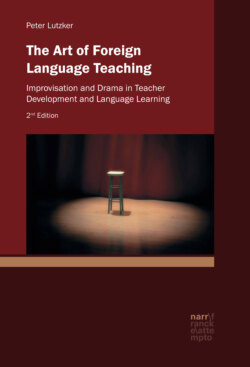Читать книгу The Art of Foreign Language Teaching - Peter Lutzker - Страница 53
На сайте Литреса книга снята с продажи.
5.2 Bataclown and Carl Rogers
ОглавлениеIn their approach to clowning, Bataclown was profoundly influenced by the writings of the American psychologist Carl Rogers whose work was shaped by his conviction that an individual’s sense of wholeness and well-being was dependent on a sense of personal authenticity. He believed that authenticity was dependent on a sense of congruence between what a person feels and his awareness of those feelings. He maintained that the incongruence between how people view themselves and how they actually experience their lives was a primary cause of self-estrangement. Rogers writes,
…the usual adult – I feel I am speaking for most of us – has an approach to values which has these characteristics:
The majority of his values are introjected from other individuals or groups significant to him, but are regarded by him as his own.
The source or focus of evaluation on most matters lies outside of himself.
The criterion by which his values are set is the degree to which they will cause him to be loved or accepted.
These conceived preferences are either not related at all, or not clearly related, to his own process of experiencing …221
It is in this estrangement from one’s inner experience that Rogers sees a basic conflict of modern man:
By taking over the concepts of others as our own, we lose contact with the potential wisdom of our own functioning, and lose confidence in ourselves. Since these value constructs are often sharply at variance with what is going on in our own experiencing, we have in a very basic way divorced ourselves from ourselves, and this accounts for much of modern strain and insecurity. This fundamental discrepancy between the individual’s concepts and what he is actually experiencing, between the intellectual structure of his values and the valuing process going on unrecognized within him – this is a part of the fundamental estrangement of modern man from himself.222
Not only does he view self-awareness and self-acceptance as a necessary basis for establishing a sense of personal congruence, but Rogers considers these steps to be the basis for establishing any form of sustaining and trusting relationship with others:
Can I be in some way which will be perceived by the other person as trustworthy, as dependable or consistent in some deep sense? (…) I have come to recognize that being trustworthy does not demand that I be rigidly consistent but that I be dependably real. The term “congruent’” is one that I have used to describe the way I would like to be. By this I mean that whatever feeling or attitude I am experiencing would be matched by my awareness of that attitude. When this is true, I am a unified or integrated person in that moment, and hence I can be whatever I deeply am. (…) It has made it seem to me that the most basic learning for anyone who hopes to establish any kind of helping relationship is that it is safe to be transparently real.223 (italics in original)
It is the connections between these processes and clowning which Vivian Gladwell has made the cornerstone of his work. They can be considered as potentially significant in a wide range of fields. The potential relevance of his approach has become increasingly clear to a growing number of professional groups, as evidenced by the wide range of courses that Vivian Gladwell teaches. Before we explore his work with language teachers, it will be helpful to look briefly at his work in other, related professions.
